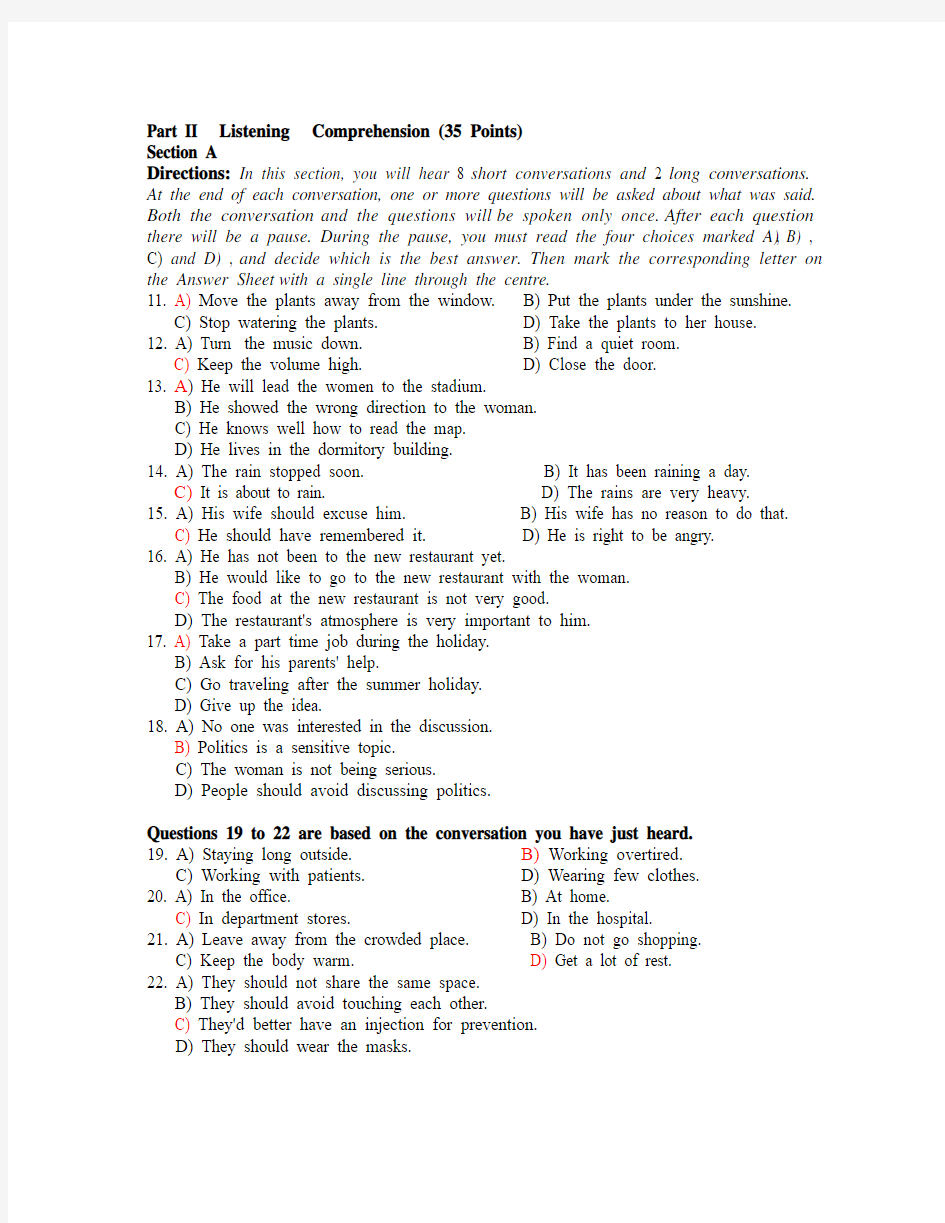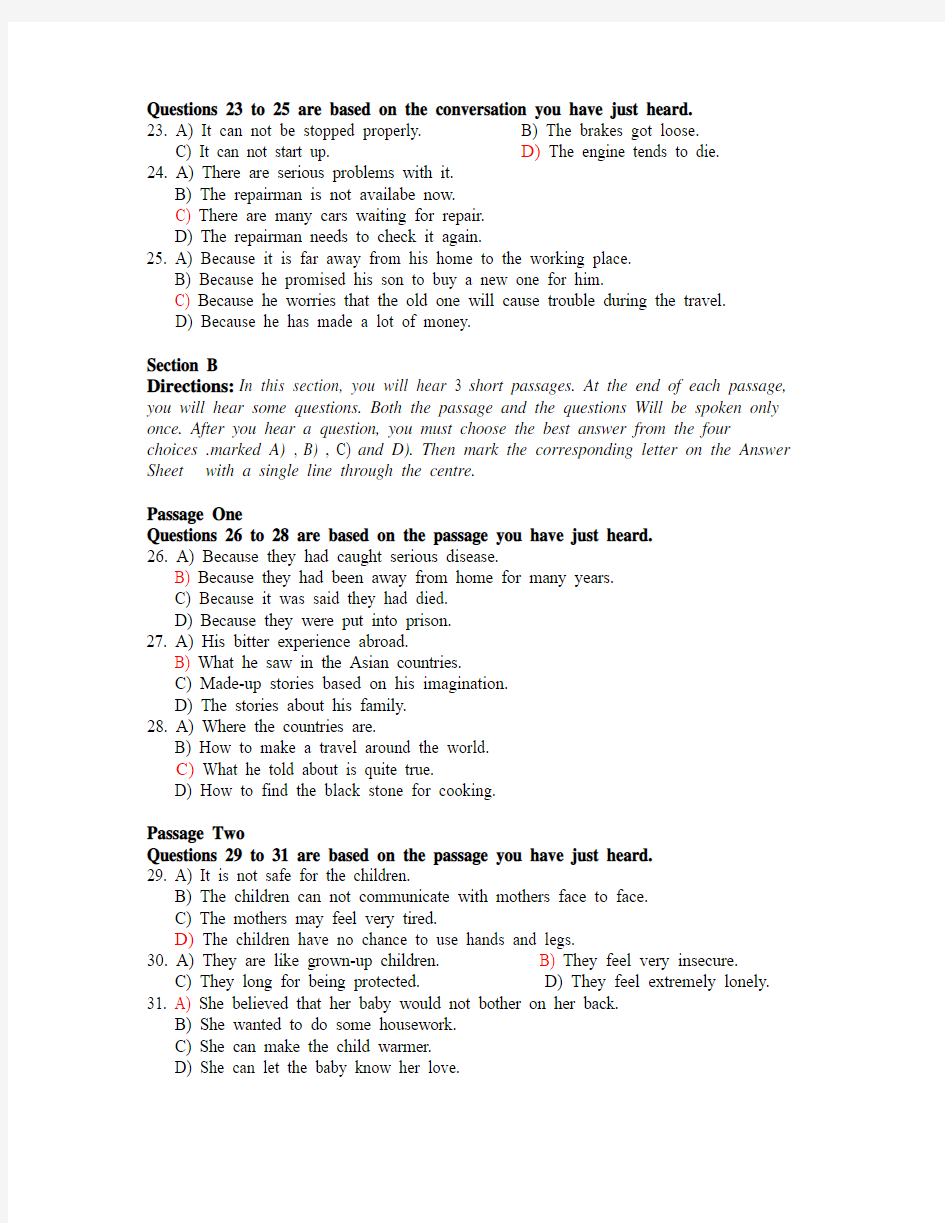

Part II Listening Comprehension (35 Points)
Section A
Directions: In this section, you will hear 8 short conversations and 2 long conversations. At the end of each conversation, one or more questions will be asked about what was said. Both the conversation and the questions will be spoken only once. After each question there will be a pause. During the pause, you must read the four choices marked A) , B) , C) and D) , and decide which is the best answer. Then mark the corresponding letter on the Answer Sheet with a single line through the centre.
11. A) Move the plants away from the window. B) Put the plants under the sunshine.
C) Stop watering the plants. D) Take the plants to her house.
12. A) Turn the music down. B) Find a quiet room.
C) Keep the volume high. D) Close the door.
13. A) He will lead the women to the stadium.
B) He showed the wrong direction to the woman.
C) He knows well how to read the map.
D) He lives in the dormitory building.
14. A) The rain stopped soon. B) It has been raining a day.
C) It is about to rain. D) The rains are very heavy.
15. A) His wife should excuse him. B) His wife has no reason to do that.
C) He should have remembered it. D) He is right to be angry.
16. A) He has not been to the new restaurant yet.
B) He would like to go to the new restaurant with the woman.
C) The food at the new restaurant is not very good.
D) The restaurant's atmosphere is very important to him.
17. A) Take a part time job during the holiday.
B) Ask for his parents' help.
C) Go traveling after the summer holiday.
D) Give up the idea.
18. A) No one was interested in the discussion.
B) Politics is a sensitive topic.
C) The woman is not being serious.
D) People should avoid discussing politics.
Questions 19 to 22 are based on the conversation you have just heard.
19. A) Staying long outside. B) Working overtired.
C) Working with patients. D) Wearing few clothes.
20. A) In the office. B) At home.
C) In department stores. D) In the hospital.
21. A) Leave away from the crowded place. B) Do not go shopping.
C) Keep the body warm. D) Get a lot of rest.
22. A) They should not share the same space.
B) They should avoid touching each other.
C) They'd better have an injection for prevention.
D) They should wear the masks.
Questions 23 to 25 are based on the conversation you have just heard.
23. A) It can not be stopped properly. B) The brakes got loose.
C) It can not start up. D) The engine tends to die.
24. A) There are serious problems with it.
B) The repairman is not availabe now.
C) There are many cars waiting for repair.
D) The repairman needs to check it again.
25. A) Because it is far away from his home to the working place.
B) Because he promised his son to buy a new one for him.
C) Because he worries that the old one will cause trouble during the travel.
D) Because he has made a lot of money.
Section B
Directions:In this section, you will hear 3 short passages. At the end of each passage, you will hear some questions. Both the passage and the questions Will be spoken only once. After you hear a question, you must choose the best answer from the four choices .marked A) , B) , C) and D). Then mark the corresponding letter on the Answer Sheet with a single line through the centre.
Passage One
Questions 26 to 28 are based on the passage you have just heard.
26. A) Because they had caught serious disease.
B) Because they had been away from home for many years.
C) Because it was said they had died.
D) Because they were put into prison.
27. A) His bitter experience abroad.
B) What he saw in the Asian countries.
C) Made-up stories based on his imagination.
D) The stories about his family.
28. A) Where the countries are.
B) How to make a travel around the world.
C) What he told about is quite true.
D) How to find the black stone for cooking.
Passage Two
Questions 29 to 31 are based on the passage you have just heard.
29. A) It is not safe for the children.
B) The children can not communicate with mothers face to face.
C) The mothers may feel very tired.
D) The children have no chance to use hands and legs.
30. A) They are like grown-up children. B) They feel very insecure.
C) They long for being protected. D) They feel extremely lonely.
31. A) She believed that her baby would not bother on her back.
B) She wanted to do some housework.
C) She can make the child warmer.
D) She can let the baby know her love.
Passage Three
Questions 32 to 35 are based on the passage you have just heard.
32. A) Because the destination is very far. B) Because they can keep warm.
C) Because the trip is very dangerous. D) Because the trip is very lonely.
33. A) There is still no exact explanation up to now.
B) The birds have the acute sense about the weather.
C) The birds can tell it from the moving of the Sun.
D) The other birds in the flock send the information.
34. A) The sun is in the same direction.
B) They can see the compass.
C) They have made the sign on the way.
D) They have the instinct to tell the direction.
35. A) To find safer living places. B) To search for food.
C) To leave the colder place. D) To find more friends.
Section C
Directions:In this section, you will hear a passage three times. When the passage is read
for the first time, you should listen carefully for its general idea. When the passage is
read for the second time, you are required to fill in the blanks numbered from 36 to 43
with the exact words you have just heard. For blanks numbered from 44 to 46 you are required to fill in the missing information. For these blanks, you can either use the exact words you have just heard or write down the main points in your own words. Finally,
when the passage is read for the third time, you should check what you have written.
The human brain is the most complex structure in the universe. It contains ( 36 )
___________ 100 billion nerve cells, each of which has thousands of connections with each other. Their (37) _____________ controls each of the body's functions, allows thoughts, perceptions, memories, feelings, and also (38)___________ and communication. Understanding just how the brain works, in health or in sickness, is one of the greatest
(39) ______________of our time. What is determined by genes, what is formed by
experience? Scientists are (40)_____________all aspects of the nervous system.
Great progress can be ( 41 ) _________ in visualizing and modeling brain functions,
as well as in research into their biological basis. Today, it is (42)_____________that
30 to 50 percent of human genes exercise their function chiefly in the brain. This
gives an (43)______________of the complexity of the genetic control and
development. The cause of many nerve diseases( 44 ) _________ defects in genes
that play a role in development. Half of all genetic diseases affect the nervous
system. The brain can only reach its full capability through interaction with its
surroundings. Researchers are examining the interaction of genes and experiences
(45) _____________ the expression and fine-tuning of nerve circuits in the brain
. How do nerve cell processes find their goal? How do different brain areas develop?
How do perceiving functions mature? Thanks to research, the prevention and cure of
many brain diseases seems possible for the first time. Better knowledge of the way
the brain (46)__________ information could, moreover, make new computers
possible.
Key to Test
11-15 A C A C C 16-20 C A B B C 21-25 D C D C C 26-30 B BC D B 31-35 A C A D B
(36) roughly (37) interaction (38) movement (39) challenges (40) investigating (41) expected (42) assumed (43) indication (44) lies in (45) with regard to (46) processes